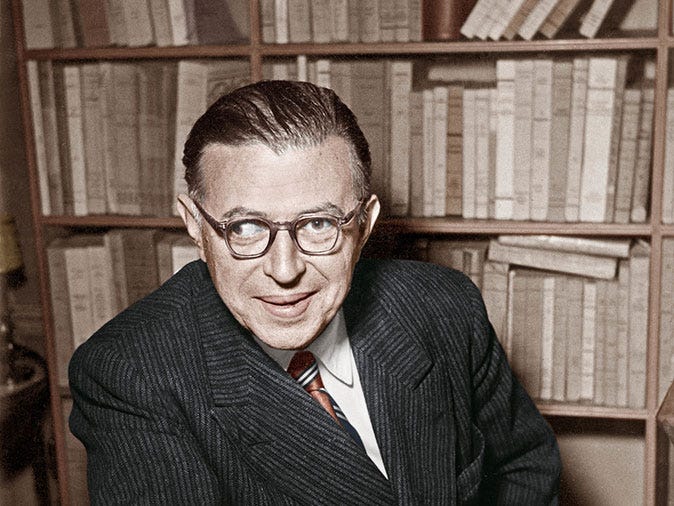breaking up with jean-paul sartre
People always say things like “man creates his own future” or “this or that person is a self-made billionaire,” and that’s a noble thing. Unless you’re of a contemptuous sort or just a downer, they work wonders in reaffirming your capacity and free will. Sentiments like these are so popular because they make people feel empowered, but also, I really can’t imagine a society so impotent because it doesn’t believe that its actions matter. Even though I can’t speak for the truth in them, their effect on the collective mind of society is undeniable: people protest, recycle, and go vegan because they know their individual actions add up to something. I, however, tend to litter because of my lack of faith. There’s a bunch of them here anyway, I take note every time I flick off another cigarette butt on the street.
The thing is that I would like to believe in myself, so much so that I have, for so long, been idolizing certain French thinkers who made their living preaching and defending their philosophies of self-sufficiency. Humans don’t come into the world to fit into a mold: anyone could be anything. They argued eloquently, I appreciated the cleverness in their novels, and they imbued their fictional characters with indubitable human qualities that I thought I was convinced. They were so easy to relate to, and their ideas were intellectually stimulating to convey their erudition, yet simple enough to resonate with just about anyone. I took their word as the truth and shaped my worldview through theirs.
But it felt a little uncomfortable, almost as if I was forcing myself to believe what they were saying. It just so happens, I eventually figured, that cornering myself to agree with my revered heroes was in direct contradiction with their philosophy. They said there were no set rules, and had I let myself deliberate, I would naturally arrive at the same conclusions as them. Instead, what I did out of childish admiration was skip the deliberation and accept their conclusions as my ground rules. I forgot I was reading books meant to guide my thinking, not dictate it. “It’s just a giant rock floating in space,” I would read, “and all limitations are social constructs.” That must be so, I thought. I had mishandled the whole premise of existential philosophy.
“Sartre spent most of his life in Paris, where he often went to cafes on the Left Bank and sat on benches in the Jardin du Luxembourg,” reads an article on the French philosopher Jean-Paul Satre. Compare this to a slightly different landscape, where I grew up, where children clean sewage drains and women earn $37 a month working at garment factories. Two lives being so contrary to each other, it must, then, take an awful lot to impose the worldview of one upon the other. No wonder, it took so much effort on my end. I thought everyone that played by the rules did so because their conscience hadn’t matured, what Sartre called living in ‘bad faith’. That is, the way people make themselves act, work, or live a certain way because it is the convention, the right way, and I certainly wasn’t one of them, because I had committed to my free will.
There was something so odd about my stance. Did the 12 year old working at the brick factory also suffer from an immature conscience? Had they read Sartre, would they be liberated, and be free to pursue their authentic self? Where I’m coming from, it feels so utterly diabolical to say that the greatest and ultimate force is free will, that a 9 year old who’s forcibly married to a 50 year old in a village in Bangladesh is living in bad faith. The flaw that I now recognize in the philosophy of the French bourgeois is that there are, in fact, powers higher than the self. [incomplete]
When I started writing this post, I thought I had an original thought. However, I just happened to Google something about Sartre and found out that he was criticized by his contemporaries, including Simone de Beauvoir and Albert Camus, and even Martin Heidegger, who inspired his philosophy. Sartre had his ass beat so hard that he somewhat abandoned his philosophy and embraced more Marxist ideas towards the end, and his writing on existentialism failed to remain popular in French discourse. This piece was going to be longer, and I was just starting to get to my point, but I have to abandon it now, because I feel satisfied with the work of Sartre’s critics, and I am happy that he died knowing better. I’m still going to post it because I need to announce that I also know better now.


